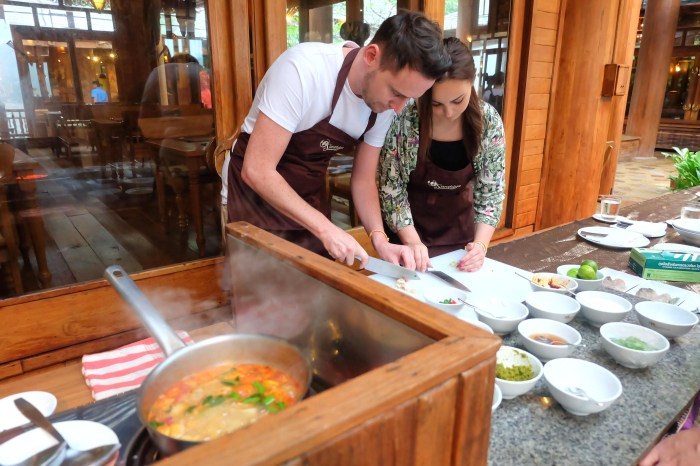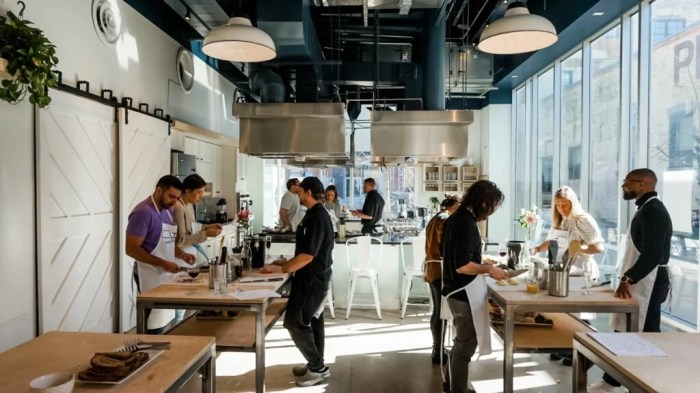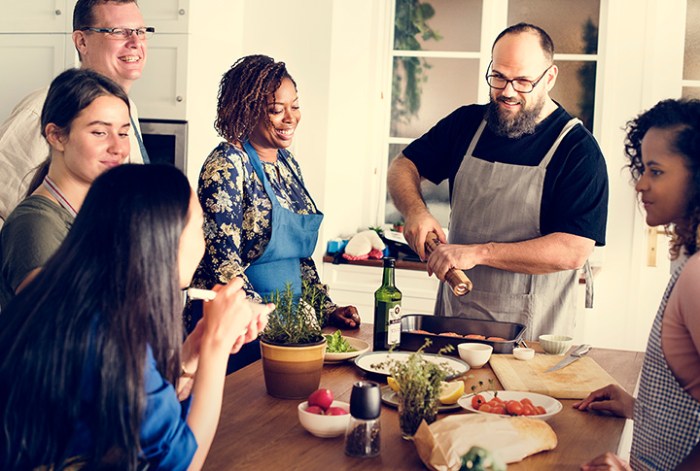Hotels with cooking classes offer a unique blend of hospitality and culinary adventure, inviting travelers to immerse themselves in local cuisines while enjoying luxurious accommodations. These experiences not only tantalize the taste buds but also provide a vibrant way to connect with the culture of a destination. Picture yourself whipping up traditional dishes under the guidance of skilled chefs, learning secrets that transform simple ingredients into culinary masterpieces.
Across the globe, many hotels have embraced this concept, creating spaces where guests can cook, taste, and learn. From mastering the art of pasta-making in Italy to perfecting the technique of sushi rolling in Japan, the culinary offerings are as diverse as the locations themselves. This fusion of cooking and travel enriches the overall guest experience, making every meal a celebration of local traditions.
Overview of Hotels with Cooking Classes

Hotels offering cooking classes have emerged as a popular trend among travelers seeking immersive experiences. These establishments blend hospitality with culinary education, allowing guests to learn the art of cooking while enjoying the comforts of a luxury hotel. This combination not only enhances the travel experience but also fosters a deeper connection to the local culture and cuisine, making it an appealing option for food enthusiasts and curious travelers alike.The benefits of combining hospitality with culinary experiences are manifold.
Guests have the opportunity to engage in hands-on cooking sessions led by professional chefs, often utilizing local ingredients and traditional techniques. This not only enriches their understanding of the destination’s culinary heritage but also allows them to take home new skills and recipes. Additionally, these classes create a social atmosphere where guests can bond over shared cooking experiences, making their stay more memorable.
Several hotels worldwide are renowned for their exceptional cooking classes, appealing to both novice cooks and seasoned chefs.
Notable Hotels Known for Their Cooking Classes
Many hotels across the globe have distinguished themselves by offering exceptional cooking classes that attract culinary enthusiasts. Here are a few examples:
- Four Seasons Resort Bali at Jimbaran Bay, Indonesia: This resort features a culinary academy where guests can learn traditional Balinese cooking techniques, using organic ingredients sourced from local markets.
- The Ritz-Carlton, Naples, Florida, USA: Known for its cooking school, the resort hosts a range of classes that cover everything from baking artisan bread to preparing gourmet seafood dishes.
- La Mirande, Avignon, France: Located in the heart of Provence, this historic hotel offers cooking classes focusing on French cuisine, utilizing fresh, local produce from nearby markets.
- Alma del Lago Suites & Spa, Patagonia, Argentina: This hotel combines stunning views with culinary experiences, offering classes where guests can learn to prepare classic Argentine dishes, including asado (barbecue).
- Mandarin Oriental, Bangkok, Thailand: Renowned for its culinary school, this hotel provides a diverse range of classes that explore Thai cooking traditions and techniques.
Each of these hotels has crafted unique culinary experiences that not only showcase the local culture but also enable guests to hone their culinary skills in an inviting environment. The integration of cooking classes into hotel stays enhances the overall experience, allowing travelers to create lasting memories through food.
For wine enthusiasts, indulging in a delightful evening at hotels with wine tasting events can be a perfect getaway. These hotels often organize exclusive tastings featuring local vineyards, giving you a chance to savor unique flavors while enjoying the ambiance of luxurious surroundings. It’s an ideal way to explore the world of wine and enhance your palate.
Types of Cooking Classes Offered: Hotels With Cooking Classes

Cooking classes at hotels provide an immersive experience that allows guests not only to enjoy local flavors but also to gain hands-on culinary skills. These classes are designed to cater to a variety of interests, from local cuisine enthusiasts to baking aficionados and gourmet cooking fans. The diversity in class offerings ensures that there is something for everyone, making the culinary journey both educational and enjoyable.Different styles of cooking classes are often offered at hotels, each designed to enhance participants’ culinary repertoire while showcasing the region’s unique flavors.
If you’re dreaming of a night under the stars, consider booking a stay at one of the hotels with stargazing. These accommodations provide breathtaking views of the cosmos, allowing you to unwind and connect with nature. Imagine sipping a warm drink while gazing at constellations—it’s an experience that can rejuvenate your spirit.
Guests can expect to learn techniques that span traditional methods to modern culinary trends. These classes range from casual, fun experiences to more intensive sessions, suitable for various skill levels.
Unique Cooking Classes and Skills Learned
Hotels often curate a selection of unique cooking classes that focus on specific themes or techniques. These sessions provide participants with the opportunity to master new skills while exploring local ingredients and traditions. Here are some examples of unique cooking classes and the skills that participants can expect to learn:
- Local Cuisine Cooking: Participants learn to prepare iconic dishes from the region, gaining insight into the cultural significance and history of each recipe.
- Baking Mastery: This class focuses on the art of baking, from bread making to pastry techniques, allowing students to create artisanal baked goods.
- Gourmet Cooking: Aimed at food enthusiasts, this class delves into advanced cooking techniques and presentation skills, helping participants elevate their culinary creations.
- Vegetarian and Vegan Cooking: This class teaches the preparation of delicious plant-based meals, emphasizing creativity and flavor without animal products.
- Seafood Preparation: Participants learn how to select, fillet, and cook a variety of seafood, often incorporating local catches into their dishes.
The seasonal and themed classes add an extra layer of excitement to the cooking experience. These classes often align with holidays or special events, providing guests with the chance to learn and celebrate culinary traditions. Examples include:
- Holiday Cooking Classes: Focused on festive dishes, these classes teach participants how to prepare traditional holiday meals, enhancing the seasonal spirit.
- Summer BBQ Techniques: Participants learn grilling techniques for meats and vegetables, exploring marinades and sides that complement outdoor dining.
- Harvest Cooking: This class emphasizes using seasonal produce, allowing participants to create dishes that celebrate the flavors of the harvest.
- International Cuisine Nights: Each class highlights a different country’s culinary traditions, providing a passport of flavors for participants.
- Pastry and Dessert Workshops: Focused on sweets, participants learn to create desserts that range from traditional confections to modern interpretations.
Each of these unique classes not only enhances culinary skills but also deepens the understanding of food culture, allowing participants to bring a piece of their experience back home.
Guest Experiences and Testimonials

The experience of learning to cook in a hotel setting not only enhances culinary skills but also creates lasting memories. Guests often share how these cooking classes have transformed their perception of food, culture, and even their own cooking abilities. The testimonials highlight the unique blend of relaxation and education that these classes provide, making them a must-try for travelers.Feedback from guests who have participated in cooking classes at various hotels reveals a wealth of positive experiences.
Participants often emphasize the quality of instruction, the creativity involved in the cooking process, and the joy of sharing meals with fellow guests. Here, we present a compilation of guest reviews that showcase their memorable culinary journeys.
Guest Reviews and Ratings
A detailed overview of guest experiences includes ratings based on participant feedback across several hotels offering cooking classes. Below is a table summarizing various hotels along with ratings derived from guest testimonials.
| Hotel Name | Location | Rating (out of 5) | Guest Comments |
|---|---|---|---|
| The Culinary Retreat | Tuscany, Italy | 4.9 | “An unforgettable experience! The pasta-making class was a highlight of our trip.” |
| Seaside Cooking Academy | Malibu, California | 4.7 | “The chef was superb, and the views were breathtaking!” |
| Mountain Lodge Culinary School | Aspen, Colorado | 4.5 | “Loved learning local recipes and the food was exquisite!” |
| Urban Gourmet Hotel | New York City, NY | 4.8 | “A fun night with friends! The sushi-making class was a blast.” |
To provide a deeper insight into the guest experiences, here are some memorable anecdotes shared by participants:
“I still remember the joy of making traditional risotto with fresh ingredients from the local market. The chef’s passion was infectious!”
“The best part was sharing the meal we cooked together with the group. It felt like a family gathering, even though we were all strangers just hours before.”
These stories reflect not only the culinary skills taught but also the community and camaraderie fostered during these classes. Guests leave with not just new recipes but a sense of connection to both the cuisine and the people they met along the way.
Tips for Choosing the Right Hotel with Cooking Classes

Selecting the right hotel with cooking classes can enhance your culinary journey, turning a simple getaway into an immersive gastronomic experience. When researching options, it’s essential to consider factors such as location, class size, the expertise of the instructors, and the overall amenities offered by the hotel. A well-chosen hotel can offer not only cooking classes but also unique dining experiences that complement your culinary learning.Understanding the variety of cooking classes available and how they align with your interests is crucial.
Some hotels focus on regional cuisine, while others may offer specialized classes like baking or international dishes. Guest amenities also play a significant role in your overall experience, as accommodations can vary widely in terms of comfort and additional services. Evaluating all these aspects can lead you to the perfect choice for your culinary adventure.
Key Factors in Hotel Selection
When considering a hotel for cooking classes, several critical factors should guide your decision-making process. These elements help ensure that your experience is enjoyable and tailored to your preferences.
- Location: Proximity to local markets or culinary hotspots can enhance your learning experience.
- Class Size: Smaller classes often provide more personalized attention and hands-on experience.
- Instructor Experience: Look for chefs with a proven track record or credentials in culinary education.
- Culinary Focus: Consider whether the hotel specializes in a specific cuisine that interests you or offers diverse options.
- Guest Amenities: Evaluate the accommodations, dining options, and additional services such as spa treatments or local excursions.
Comparison of Hotels
A side-by-side comparison of hotels based on their cooking class offerings can be enlightening. Here’s a brief overview of what to look for in the class offerings and related guest amenities:
| Hotel Name | Type of Cooking Class | Class Size | Other Amenities |
|---|---|---|---|
| Gourmet Haven | Italian Cuisine | Max 8 | Outdoor Pool, Full-Service Spa |
| Chef’s Retreat | Pastry & Baking | Max 12 | Fine Dining Restaurant, Wine Tastings |
| Farm to Table Lodge | Local Farm-to-Table | Max 6 | Organic Garden, Guided Tours |
This comparison highlights the diversity in class types and amenities among different hotels, making it easier to find the right fit for your culinary pursuits.
Preparation for Cooking Classes, Hotels with cooking classes
To maximize your learning and enjoyment during cooking classes at a hotel, some preparation is advisable. Consider the following tips to make the most of your experience:
- Kitchen Gear: Familiarize yourself with basic kitchen utensils and tools you might use in class, such as knives, cutting boards, and measuring cups.
- Recipe Notes: If possible, request a list of recipes in advance so you can review them and come prepared with questions.
- Comfortable Clothing: Wear comfortable, functional clothing and shoes suitable for a kitchen environment.
- Allergies and Preferences: Communicate any dietary restrictions to the instructors to ensure a safe and enjoyable experience.
By taking these steps before your class, you can enhance your culinary skills and enjoy the full benefits of your cooking class experience at the hotel.
Cultural Benefits of Cooking Classes in Hotels
Cooking classes offered in hotels provide an exceptional opportunity for travelers to immerse themselves in the local culture. These classes not only educate visitors about the intricacies of regional cuisine but also foster a deeper connection to the destination through its culinary traditions. Engaging in cooking allows guests to experience firsthand the flavors, techniques, and stories behind each dish, enriching their overall travel experience.Learning local culinary techniques and ingredients is crucial for a comprehensive understanding of a region’s culture.
Each area has its unique culinary heritage shaped by its history, geography, and the diverse groups that inhabit it. By participating in cooking classes, travelers gain insight into the local lifestyle, traditions, and even the agricultural practices that sustain them. This experiential learning creates lasting memories and encourages a more thoughtful approach to travel.
Cultural Dishes and Their Significance
Each region boasts signature dishes that hold cultural significance and tell a story about its people. Understanding and preparing these dishes in cooking classes can enhance a traveler’s appreciation for the destination. Here are some examples:
- Italy: Risotto
-This creamy rice dish from Northern Italy highlights the use of local ingredients such as Arborio rice and seasonal vegetables. Cooking risotto teaches participants about the Italian concept of “cucina povera,” where simple ingredients create rich flavors. - Mexico: Mole
-A complex sauce made with various chilies, spices, and chocolate, mole embodies the fusion of indigenous and colonial influences. Classes often emphasize the importance of local ingredients, such as masa and herbs, that distinguish the dish. - Japan: Sushi
-The art of making sushi involves precision and respect for fresh ingredients. Learning to prepare sushi not only provides culinary skills but also introduces students to the Japanese philosophy of harmony in food. - India: Curry
-Each region in India has its own version of curry, showcasing the diversity of spices and cooking techniques. Through classes, travelers learn about the significance of each spice and its role in creating a balanced dish. - Thailand: Pad Thai
-This popular street food combines stir-fried noodles with a mix of flavors, including sweet, sour, and salty. Cooking Pad Thai teaches students about the balance of flavors that is central to Thai cuisine.
By delving into these dishes, travelers not only refine their cooking skills but also develop a deeper understanding of the cultural narratives that each dish represents. Engaging in such culinary experiences fosters a stronger connection to the local community and enhances the overall travel experience.